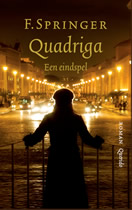F. Springer
Quadriga, An End-Game (Quadriga, een eindspel)
A final tour de force
The subtitle of F. Springer’s new novel Quadriga strikes a sensitive note with his readers, ‘end-game’ refers not only to the extraordinarily thrilling backdrop of the tragic story of travel writer Robert Somers – the last days of the GDR before the fall of the Berlin Wall – but also has undeniably melancholy connotations with regard to the author himself: this may well be his last novel.
F. Springer, the pseudonym of Carel Jan Schneider, now nearly eighty years old, is a writer and former diplomat. Over the years – his debut, Bericht uit Hollandia (Message From Hollandia) was written in 1962 – he has produced a rich, concise, intelligent and ironic body of work set in all the places he has filled diplomatic posts. East Berlin, where he was an ambassador from 1985 until 1989, was his last posting. After the publication of Springer’s previous novel, Kandy, readers anxiously awaited the ‘Berlin book’. Springer began it fifteen years ago, but faltered. Reality was still too raw, it was difficult to find a way into the story.
With Quadriga in hand, its title a reference to the goddess of Victory and her coach-and-four on the Brandenburg Gate, we know it was worth waiting for. Quadriga is a vintage Springer.
So what makes a Springer a real Springer? To start with, the superior descriptions of the atmosphere of the stories’ locations. Springer succeeds in evoking the smells and colours of bygone eras and faraway places. In Quadriga, the bizarre situation in communist Germany, characterised by the astonishing, distorted duplicity of the inhabitants of the GDR (‘Feind hört mit!’/ the enemy listens in) and the blinkers of the Honecker regime, are striking.
Springer always proves to be a wonderful, almost ‘old-fashioned’, storyteller in the tradition of Somerset Maugham and Scott Fitzgerald. The love story of Robert Somers and the indescribably beautiful East German civil servant, Monika Rittner, grips the reader right up to the final page. Will he find her? That is the question. Somer’s memories all fall into place when, twenty years later, he returns to Berlin to look for Monika.
Quadriga is unputdownable, but that doesn’t mean that it lacks depth. On the contrary, the tragedy of the love story reflects a human inadequacy, the impossibility of people from different worlds to truly understand oneanother. And there are other stories of the heart embedded in this novel, such as that of Ivan Boenin and his adolescent love Lika.
Most of all, though, Springer proves to be an exceptionally keen observer. Although Springer’s tone is ironic and light, not even the smallest detail escapes him. Near but far, distant yet involved, these are the central paradoxes. In Quadriga, yet again, Springer uses velvety, melancholic words to reveal the harsh truth.
Publisher
Querido
Singel 262
NL - 1016 AC Amsterdam
TEL. +31 20 551 12 62
FAX +31 20 639 19 68
E-mail: [email protected]
Website: www.querido.nl
Publishing details
Quadriga, een eindspel (2010, 186 pp)

Biography
F. Springer (1932 - 2011), one of the best-loved narrators in Dutch literature, is the pseudonym of Carel Jan Schneider. As a diplomat and administrator for the Kingdom of the Netherlands, Schneider travelled all over the world. All his postings – New Guinea, New York, Bangkok, Brussels, Dhaka, Luanda and Tehran - feature as backdrops to his stories.
The novels and short story collections Tabee New York (Goodbye New York, 1974) and Zaken overzee (Overseas Business, 1974) brought him recognition from reviewers, but it was with the novel Bougainville (Bougainville, 1981) a well-constructed, moving book, that he reached a larger readership. In it, a diplomat is confronted with the death of an old friend. Quissama (1985, about the independent Angola) and Teheran, een zwanenzang (Teheran, A Swan Song, 1991), about the fundamentalist revolution in Iran, take place in turbulent surroundings. What remains is his laconic style, reminiscent of the work of F. Scott Fitzgerald, but always with the ironic perspective of a tragic subject matter.
Schneider’s final post was East Berlin, where he was the Dutch ambassador from 1985 to 1989, the year the Berlin Wall fell. F. Springer’s latest novel Quadriga, een eindspel (Quadriga, An End-Game, 2010) is set against the background of the biggest political revolution in the modern history of Europe.
Quotes
“With all the distance the author takes care to observe […] he uses subtle hints to prepare a
climax that comes as a surprise not only to his characters. He consistently provides understandable motives for their fatal recklessness, thereby manoeuvring the reader in the direction of his characters with the result that in the end we are all staggered – except for Springer himself, who carries off the palm like an inaudibly laughing genius.”
― de Volkskrant
Category
Genre: fiction
